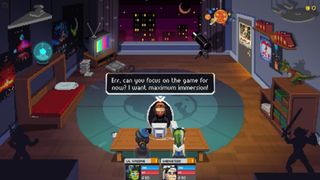Pretend to save the galaxy in an RPG about playing an RPG
Galaxy of Pen and Paper is singleplayer Dungeons & Dragons in space.

We’re being whisked to a galaxy far, far away in Galaxy of Pen and Paper, the latest addition to the Knights of Pen and Paper series. It's single player Dungeons & Dragons in space, only this time your batch of intrepid nerds are at the helm of a cutting-edge, sentient spaceship.

Learn more about the Knights of Pen and Paper series with our preview of the first game in the series.
It’s more of the self-aware, fourth wall-breaking silliness you may remember from Galaxy’s predecessors—you play a character playing a tabletop RPG character. This time, science fiction references abound, from the game's first planet Tanton, which is a clear callback to Star Wars lore, to very thinly veiled nods at the Hitchhiker's Guide to the Galaxy.
In Galaxy of Pen and Paper you choose a player and build up a tabletop RPG character for them, with options ranging from healing Medtechs to gun-happy Savages. There are different races and a number of jobs to choose from to add some spice to battle. And if you're not happy with your initial choices, there's plenty of opportunity to add new players to your party, allowing you to fill in any roles that may be missing.
Each class has their own tech tree, but most of them tend to place an emphasis on using status debuffs to gain the upper hand. New to Galaxy of Pen and Paper is unit placement—characters in the back line will be protected from attacks, but you’ll be able to use different abilities to pull squishier players into the line of fire. It leaves room for a decent amount of creativity in battle, without overwhelming less experienced players.
The debuff abilities in particular are fun to play around with. I got a kick out of casting one debuff that would inflict slow on an enemy. Once that character had the slow effect, I could use another ability the next turn that inflicted poison if my target was already slowed. These abilities play off of each other to great effect and are a blast to experiment with.
Early on, battles can often feel like a slog as you take turns chopping at enemies with your limited skillset.
New to combat, too, is the shield system, a welcome change that takes the pressure off of your inventory a bit. You no longer have to rely on healing items and abilities as much as you did in previous games, as your shields help to soak up some damage. I found the shields to be a great help, but they never made combat too easy. As I moved on to more difficult enemies, shields sopped up some damage before they were quickly overwhelmed, giving me just enough breathing room.
But early on, battles can often feel like a slog as you take turns chopping at enemies with your limited skillset. I was mindlessly clicking through encounters until I built up my list of special powers. This opens up a bit as your character progresses, but it still feels a little slow, especially if this isn't your first Pen and Paper game.
PC Gamer Newsletter
Sign up to get the best content of the week, and great gaming deals, as picked by the editors.

The tabletop roleplaying elements are present, but Behold Studios keeps the dice-rolling light. The Dungeons & Dragons vibe is mostly felt in character dialogue, and it trickles into mission selection. You can command the Dungeon Master to select which story missions you wish to pursue, or create your own side quests to grind some levels or earn gold and loot.
The story, too, is enjoyable enough. Your tiny team starts off as indentured servants before you quickly stick it to the man and hightail it to the other end of the galaxy on your newfound spaceship. The frequent nods to my favorite sci-fi universes are a treat, but I felt that Galaxy was missing the laugh out loud humor that made Knights of Pen and Paper something truly special. It's still possible that the writing will find that groove later in the game.
Galaxy of Pen and Paper is essentially Knights of Pen and Paper in space. If you loved the studio's first foray into single player tabletop games, you'll probably get a kick out of its space age cousin, but some things may be looking a little samey by this point. Rolling dice all on your own can get especially lonely after a while in the cold vacuum of space.
Most Popular


